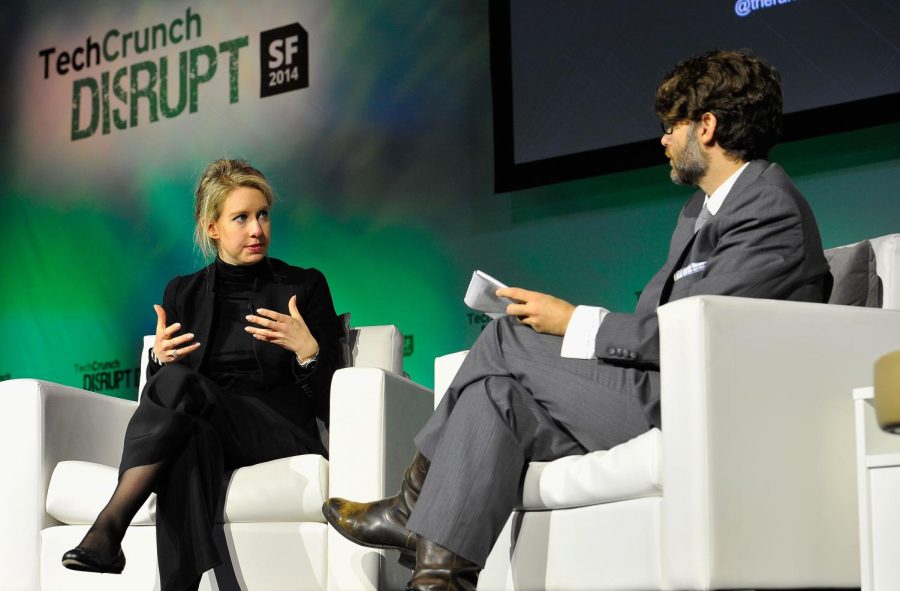The Poisoned Apple: Elizabeth Holmes goes from being billionaire to criminal
Photo used with permission from Google Commons
Theranos Chairman, CEO and Founder Elizabeth Holmes and TechCrunch writer and moderator Jonathan Shieber speak onstage at TechCrunch Disrupt at Pier 48 on Sept. 8, 2014
Elizabeth Holmes, the former CEO and founder of the now-defunct Silicon Valley health technology company, Theranos, was once the world’s youngest self-made billionaire woman, but now faces up to 80 years behind bars and a $1 million fine. This story is so popular that numerous true-crime documentaries and dramas have been made, following the rise and fall of Holmes and her company. The most popular of these include The Dropout and The Inventor: Out for Blood in Silicon Valley.
Holmes earned celebrity status in Silicon Valley as the founder of Theranos, a company that claimed they would revolutionize health by optimizing blood testing so that patients could test themselves at home using just one drop of blood.
Holmes’ legacy was her image as a ‘prodigy,’ with ideas that others apparently did not conjure up or were afraid to attempt. Holmes also portrayed strange behavior that some believe allude to an Imposter Syndrome, as she dressed herself up like Steve Jobs by wearing a black turtleneck, and got into college just to purposefully drop out like him. Holmes also changed her voice to make it deeper, establishing a more masculine version of herself in an attempt to be taken more seriously in a male-dominated industry.
After launching Theranos, Holmes was introduced to investors and quickly began to secure funding, raising around $6 million in venture capital by the end of 2004, according to The Wall Street Journal. Over the course of the next decade, Holmes gathered over $700 million in funding for Theranos.
For years, Theranos was shrouded in secrecy. Holmes would not allow investors to look at her testing labs, there was no public company website or press releases, and no one was given any details about how the technology worked. It wasn’t until 2013 that Holmes started making headlines, giving talks, and even made the covers of Forbes and Fortune, who named her the youngest self-made woman billionaire at the age of 30.
As the trust in her increased, few people bothered to look into the technology that she boasted about or the funds she raised for it. Influential men in science, politics, the startup economy and tech praised Holmes for her innovation and invested in her. However, they were only to realize that each of her lofty promises were empty from the beginning. The technology simply did not exist, and would not for years because there wasn’t science to back it. But this did not matter in the face of Holmes’ confidence. She lied about where testing happened, claiming that it was the machine she invented called Edison. But in reality, they were using traditional blood testing machines, all the while fooling the public and investors since the company’s blood-testing machine was not capable of providing accurate testing results.
Holmes’ trial was originally scheduled to begin in August 2020, but was delayed as a result of her pregnancy. Her trial began a year later in August 2021. Holmes was finally found guilty of three counts of wire fraud and one count of conspiracy to commit wire fraud. As of March 2022, Holmes is out on bail awaiting sentencing in September 2022.
According to an article by Slate, she “peddled ideas of greatness while being driven solely by self-interest.” Holmes was guided by the promises of success, neglecting to care about the actual consequences of her actions and hurting countless people with her unreliable blood tests.
Your donation will support the student journalists of Thomas S. Wootton High School. Your contribution will allow us to purchase equipment and cover our annual website hosting costs.
Emma is a 2023 graduate.







